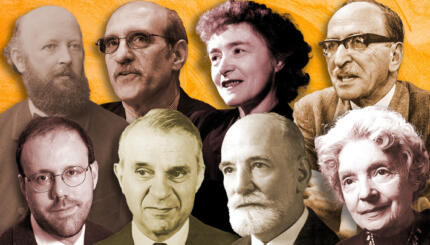Reprinted with permission from Midstream magazine.
“For the past two thousand years, the Jews have been sharpening their wit as well as their wits, on the logical grindstone of the Talmud. This may explain why so much of Jewish humor,” writes Nathan Ausubel, “has an intellectual character.” For Jewish humor is not just laughter; it is in fact, wisdom!
Twisted Logic
Consider this lovely anecdote from Eastern Europe, which is all about Talmudic logic:
After months of negotiation with the authorities, a Talmudist from Odessa is finally granted a visa to visit Moscow. He boards the train and finds an empty seat. At the next stop, a young man gets on the train and sits next to him. The scholar looks at the young man and thinks: This fellow doesn’t look like a peasant, and if he isn’t a peasant, he probably comes from this city. If he comes from this city, then he must be Jewish, because this is, after all, a predominantly Jewish area. On the other hand, if he is a Jew, where could he be going? I am the only Jew in our district who received permission to travel to Moscow.
With your help, My Jewish Learning can provide endless opportunities for learning, connection and discovery.
Ahh? That’s no problem; I know that just outside Moscow, there is a little town called Samvet, and Jews don’t need special permission to go there. Yes, but why would he be going to Samvet? He’s probably going to visit one of the Jewish families that live there, but let me think; how many Jewish families are there in Samvet? There are only two: the Bernsteins and the Steinbergs. The Bernsteins? No, that cannot be; it is a terrible family. A nice looking fellow like this young man, must be visiting the Steinbergs.
But why would he visit that family? The Steinbergs have only two daughters. So, my best guess is that he must be their son-in-law. But if he is, indeed, a son-in-law, which daughter did he marry? I heard that Sarah married a nice lawyer from Budapest, and Esther married a businessman from Zhitomir; so, I got it: he must be Sarah’s husband, and his name, people say, is Alexander Cohen.
But, if he comes from Budapest, a city where anti-Semitism is rampant, he must have changed his name. What would be the Hungarian equivalent of Cohen? It must be Kovacs. But it is well known that not everyone is allowed to change his name in Hungary, and if he was able to do so, it must be for a good reason: he must have some special status. And what could that be? Obviously, this fellow Alexander Cohen must have earned a doctorate from the University.
At this point, our Talmudic scholar turns to the young man and says, “How do you do, Dr. Kovacs?”
“Very well thank you, sir,” answers the startled passenger. “But, please tell me, how is it that you know my name?”
“Oh,” replies the Talmudist, “it’s so obvious; I knew you had to be Dr. Kovacs.”
The Wit of Wisdom
Jews have excelled not only in the art of telling humorous anecdotes, but also in their ability to make use of wit, in order to answer malevolent questions on occasion. Here is an example of wit that conveys a message of wisdom:
In the course of an interview, Isaac Bashevis Singer is questioned by a reporter about his vegetarianism:
“Are you a vegetarian for health reasons?” he is asked.
“Yes,” answers Singer, “the health of the chicken!”
Laughing at Stereotypes
Jews invented many jokes about the canards and false accusations the were leveled against them.
Here is an anecdote, told by Bulka, which meant to undo the effect of hostility and to ridicule unfounded prejudice:
A Jewish businessman is on his way home, carrying with him an important sum of money which he needs in order to provide for his family. He is attacked by an armed ganef (thief), who robs him of all his possessions. The Jew starts to sob uncontrollably, moving the thief to actually ask him why he was crying so much. The Jew then says that he could bear that his money might be taken away, but how could he face his family, who would ask him where the money had gone, and who might doubt his story that the money was stolen? Could the thief help him by providing clear evidence that he had been attacked?
“How could I help?” asks the thief. The businessman says, “Perhaps you could shoot a bullet through my coat.” The thief complies. Then the Jew asks, “Could you perhaps shoot another bullet on the other side of my coat?” The thief gladly obliges. Then the Jew asks if he could put a bullet through his hat, which the thief does. The Jew then asks for one more bullet through his hat, to which the thief says, “Sorry, I have no more bullets.”
As soon as the Jew hears this, he pounces upon the thief, pummels him into submission, and takes back all his money. As he walks away to go home, he hears the thief muttering to himself, “This goes to prove that you can never trust a damn Jew!”
Love of Learning
The love of learning and the striving for knowledge has been one of the most preeminent motivations of the Jewish people through the centuries.
A lovely Hasidic tale beautifully conveys this notion.
Reb Yehuda Leib was a great Talmid Khokhem (scholar), and he was often invited to give lectures on talmudic topics at the most prestigious yeshivas of Lithuania. After the lecture, the Rosh Yeshiva (head of the academy) would usually introduce to him his finest students so that he might examine them.
Everyone knew that Reb Yehuda Leib had a lovely daughter who had reached the age of marriage, and that the rebbe was looking for a suitable husband for his beloved Rachel. Reb Yehuda would always ask potential candidates the same difficult question, in the hope that one of them might pass the test. But so far, none had been able to answer the question.
One day, after having lectured at the great Kovno Yeshiva, the Rosh Yeshiva personally introduced to him his best student. He was particularly brilliant in every subject, and Reb Yehuda took a liking to him right away. But when he asked him the same difficult question he had asked all the other candidates, the student could not find the right answer. So Reb Yehuda took leave of his host and his best student. But as he was about to get on the coach that would take him back home, the yeshiva student came rushing to Reb Yehuda and with almost no breath left, he reached him just as he was about to close the door of his coach.
“I beg of you, rebbe,” asked the student, “would you be kind enough to tell me what the correct answer to the question is?”
And the rebbe smiled as he opened wide the door of his coach and he said, “Young man, you are the one; and now, come with me!”
This article is the second in a four-part series on the characteristics of Jewish humor. To read the next article in the series, click here.
This series originally appeared as a single article in Midstream magazine, which was anthologized in Best Jewish Writing 2003. It is reprinted with permission.
Hasidic
Pronounced: khah-SID-ik, Origin: Hebrew, a stream within ultra-Orthodox Judaism that grew out of an 18th-century mystical revival movement.
Yehuda
Pronounced: yuh-HOO-dah or yuh-hoo-DAH (oo as in boot), Origin: Hebrew, Judah, one of Joseph's brothers in the Torah.
yeshiva
Pronounced: yuh-SHEE-vuh or yeh-shee-VAH, Origin: Hebrew, a traditional religious school, where students mainly study Jewish texts.


